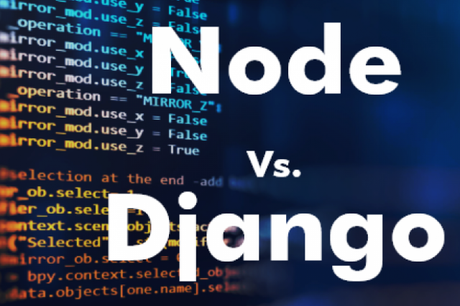
Django and NodeJs are two powerful technologies that fulfill modern web app creation demands for rich features and adaptability. All are open-source and can be downloaded for free without the need for a license. Any beginner web developers are perplexed when determining which of these solutions to use in their workflow because they are both similarly common and progressive.
Both programming languages are open source and have a vast web development community that actively improves them. While both languages have the best functionality, many developers are frustrated with deciding which one to choose for a workflow.
Django vs. NodeJS
To put it another way, NodeJs is used on the client-side of applications based on JavaScript. On the other hand, Django is a Python programming platform that developers use all over the world to deliver real-time Python software. Even though both languages are flexible in their ways, this article would compare and contrast the two. An application will run smoothly on a platform if the underlying platform can support all of its features. The application's specifications determine which platform is best for it.
Django
Django is an open-source Python web platform with a lot of features. It's most often used to build technical websites and web apps from an official site. Django is a high-level programming language in which the bulk of the coding has been abstracted away to allow for clean and functional code writing.
NodeJS
NodeJS is a JavaScript runtime environment written in C, C++, and JavaScript that is open-source. It's used to build server-side JavaScript-based high-level network applications. With JavaScript, developers can create complete and highly scalable web applications.
Django vs. NodeJs: The basics
Let's start at the very beginning. It's difficult to equate Django and NodeJs in certain respects because they're entirely different. Django is a high-level Python platform developed for rapid growth and scalability, according to our Python/Django developers. It bills itself as "the web development for perfectionists with deadlines." It's free and open-source. It operates similarly to other programming projects in that it provides pre-built modules, libraries, and software to remove the need to code anything from the ground up.
Instead of becoming a development platform, NodeJs is a runtime environment that allows developers to run frontend JavaScript code on an official site as a backend programming language. Although you can use third-party libraries, there is no substitute for the ready-made components that Django frameworks have - it's just essential, no-nonsense JavaScript coding.
The specifics
Although both Django and NodeJs are excellent backend frameworks, their distinct characteristics mean that one could be better suited to your project than the other.
- A code-light architecture based on a set of pre-built modules.
- Python is used, and it has a reputation for 'forcing' you to write items in specific ways.
- You need to build your app quickly - Django's code-light approach is ideal for this
- You're looking for encryption that's integrated straight into the code structure.
- You believe you will eventually incorporate emerging developments such as machine learning.
- you value consistency and ingenuity over speed in the development process.
- You want the app to run as quickly as possible, but it's not CPU supported.
- Your frontend is written in JavaScript, and you want to take advantage of the cost and productivity benefits that come with it.
- Your frontend is written in JavaScript, and you want to save money and increase productivity by having everybody use the same language.
